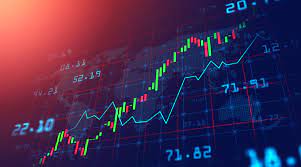
Decentralized Finance (DeFi) Revolution: Transforming Online Trading
In recent years, the financial world has witnessed a revolution in the form of decentralized finance (DeFi), which is reshaping the landscape of online trading and investing. DeFi, an emerging trend within the cryptocurrency space, offers a new paradigm for financial services, enabling users to trade, invest, and borrow without the need for traditional intermediaries like banks or brokers.
What is DeFi?
DeFi, short for decentralized finance, is a blockchain-based ecosystem that recreates traditional financial services using decentralized technology. It leverages smart contracts, which are self-executing agreements with the terms directly written into code, to automate and facilitate various financial activities. DeFi applications can encompass lending, borrowing, trading, yield farming, and much more.
Key Features of DeFi in Online Trading:
Accessibility: DeFi is open to anyone with an internet connection and a digital wallet. It provides financial services to unbanked and underbanked populations, thereby expanding access to global markets.
Permissionless Trading: DeFi platforms do not require users to undergo lengthy registration or approval processes. This means that anyone can participate in online trading without restrictions.
Liquidity Pools: DeFi relies on liquidity pools, where users can lend or provide liquidity in return for interest or fees. These pools are at the heart of decentralized trading, allowing for the quick execution of trades.
Decentralized Exchanges (DEXs): DEXs, like Uniswap and SushiSwap, enable users to trade directly from their wallets without relying on centralized exchanges. This eliminates the need to entrust funds to third parties.
Yield Farming: DeFi offers opportunities for yield farming, where users can earn rewards by providing liquidity to DeFi protocols. This has attracted traders looking to maximize their returns.
Challenges and Risks:
Despite its remarkable potential, DeFi is not without its challenges. Security vulnerabilities and smart contract bugs have led to incidents of hacking and exploitation, making it crucial for users to exercise caution and conduct thorough due diligence.
The Future of DeFi in Online Trading:
The growth and innovation in the DeFi space are showing no signs of slowing down. In the future, we can expect the integration of advanced technologies such as layer-2 solutions and cross-chain compatibility to improve scalability and reduce transaction costs. Moreover, regulators are beginning to recognize the need for responsible oversight of DeFi, which could provide added legitimacy to the space.
In conclusion, decentralized finance is revolutionizing online trading by providing greater accessibility, flexibility, and control to users. DeFi’s rapid evolution and adaptation of blockchain technology represent a significant shift in the financial industry, offering both opportunities and challenges for traders and investors. As the DeFi ecosystem continues to mature, it will play an increasingly significant role in shaping the future of online trading.